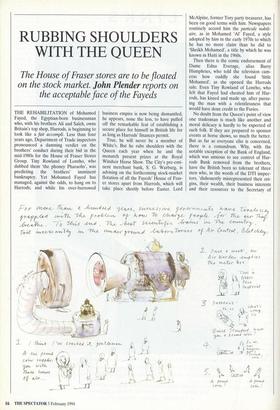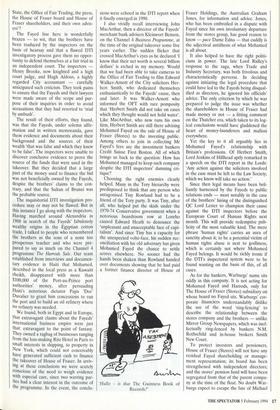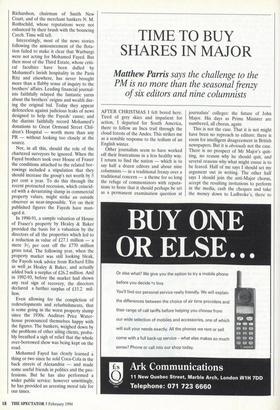RUBBING SHOULDERS WITH THE QUEEN
The House of Fraser stores are to be floated the acceptable face of the Fayeds
THE REHABILITATION of Mohamed Fayed, the Egyptian-born businessman who, with his brothers Ali and Saleh, owns Britain's top shop, Harrods, is beginning to look like a fait accompli. Less than four years ago, Department of Trade inspectors pronounced a damning verdict on the brothers' conduct during their bid in the mid-1980s for the House of Fraser Stores Group. Tiny Rowland of Lonrho, who dubbed them 'the phoney Pharaohs', was predicting the brothers' imminent bankruptcy. Yet Mohamed Fayed has managed, against the odds, to hang on to Harrods; and while his over-borrowed
business empire is now being dismantled, he appears, none the less, to have pulled off the remarkable feat of establishing a secure place for himself in British life for as long as Harrods' finances permit.
True, he will never be a member of White's. But he rubs shoulders with the Queen each year when he and the monarch present prizes at the Royal Windsor Horse Show. The City's pre-emi- nent merchant bank, S. G. Warburg, is advising on the forthcoming stock-market flotation of all the Fayeds' House of Fras- er stores apart from Harrods, which will take place shortly before Easter. Lord
McAlpine, former Tory party treasurer, has been on good terms with him. Newspapers routinely accord him the panic* nobili- aire, as in Mohamed 'Al' Fayed, a style adopted by him in the early 1970s to which he has no more claim than he did to `Sheikh Mohamed', a title by which he was known in Haiti in the 1960s.
Then there is the comic endorsement of Dame Edna Everage, alias Barry Humphries, who told the television cam- eras how cuddly she found 'little Mohamed', as she opened the Harrods sale. Even Tiny Rowland of Lonrho, who felt that Fayed had cheated him of Har- rods, has kissed and made up, after pursu- ing the man with a relentlessness that would have done credit to the Furies.
No doubt from the Queen's point of view one tradesman is much like another and moral delicacy is hardly to be expected of such folk. If they are prepared to sponsor events at horse shows, so much the better. But as far as everyone elk is concerned, there is a conundrum. Why, with the notable exception of the Bank of England, which was anxious to see control of Har- rods Bank removed from the brothers, have the British been so tolerant of three men who, in the words of the DTI inspec- tors, 'dishonestly misrepresented their ori- gins, their wealth, their business interests and their resources to the Secretary of State, the Office of Fair Trading, the press, the House of Fraser board and House of Fraser shareholders, and their own advis- ers'?
The Fayed line here is wonderfully brazen — to wit, that the brothers have been traduced by the inspectors on the basis of hearsay and that a flawed DTI investigatory process gave them no oppor- tunity to defend themselves at a fair trial in an independent court. The inspectors Henry Brooke, now knighted and a high court judge, and Hugh Aldous, a highly regarded City accountant — carefully anticipated such criticism. They took pains to ensure that the Fayeds and their lawyers were made aware of the scope and pur- pose of their inquiries in order to avoid accusations that they had resorted to 'trial by ambush'.
The result of their efforts, they found, was that the Fayeds, under solemn affir- mation and in written memoranda, gave them evidence and documents about their background and the sources of their wealth 'that was false and which they knew to be false'. The inspectors were unable to discover conclusive evidence to prove the source of the funds that were used in the takeover. But they decided that a large part of the money used to finance the bid was not beneficially owned by the Fayeds, despite the brothers' claims to the con- trary, and that the Sultan of Brunei was the probable source.
The inquisitorial DTI investigation pro- cedure may or may not be flawed. But in this instance I go along with the inspectors. Having marched around Alexandria in 1988 in search of the Fayeds' fabulously wealthy origins in the Egyptian cotton trade, I talked to people who remembered the brothers as the sons of a none too prosperous teacher and who were pre- pared to say as much on the Channel 4 programme The Harrods Sale. Our team established from interviews and documen- tary evidence in Haiti that Mohamed, described in the local press as a Kuwaiti sheikh, disappeared with more than $100,000 of the Port-au-Prince port authorities' money, after persuading Haiti's notorious dictator Papa 'Doc' Duvalier to grant him concessions to run the port and to build an oil refinery where no refinery was needed.
We found, both in Egypt and in Europe, that extravagant claims about the Fayeds' international business empire were just that: extravagant to the point of fantasy. They owned a ragbag of businesses ranging from the loss-making Ritz Hotel in Paris to small interests in shipping, to property in New York, which could not conceivably have generated sufficient cash to finance the takeover of House of Fraser. In arriv- ing at these conclusions we were acutely conscious of the need to weigh evidence with especial care, since two warring par- ties had a clear interest in the outcome of the programme. In the event, the conclu- sions were echoed in the DTI report when it finally emerged in 1990.
I also vividly recall interviewing John MacArthur, then a director of the Fayeds' merchant bank advisers Kleinwort Benson, on the Channel 4 Business Programme, at the time of the original takeover some five years earlier. The sudden flicker that crossed MacArthur's eyes as he declared 'I know that their net worth is several billion dollars' is etched in my memory. Would that we had been able to take cameras to the Office of Fair Trading to film Edward Walker-Arnott of the City solicitors Her- bert Smith, who dedicated themselves enthusiastically to the Fayeds' cause, then and later. It was Walker-Arnott who informed the OFT with rare pomposity that 'Herbert Smith did not take on cases which they thought would not hold water'. Like MacArthur, who now runs his own firm, Herbert Smith are still there advising Mohamed Fayed on the sale of House of Fraser (Stores) to the investing public. Among others to join in collecting Mr Fayed's fees are the investment bankers Credit Suisse First Boston. All of which brings us back to the question: How has Mohamed managed to keep such company despite the DTI inspectors' damning cri- tique?
Choosing the right enemies clearly helped. Many in the Tory hierarchy were predisposed to think that any person who antagonised Tiny Rowland had to be a friend of the Tory party. It was Tiny, after all, who helped put the skids under the 1970-74 Conservative government when a notorious boardroom row at Lonrho caused Edward Heath to denounce the `unpleasant and unacceptable face of capi- talism'. And since Tiny has a capacity for the unexpected volte-face, his sudden rec- onciliation with his old adversary has given Mohamed Fayed the chance to settle scores elsewhere. No sooner had the hands been shaken than Rowland handed over documents showing that he had paid a former finance director of House of
'Hullo Is that The Guinness Book of
Records?'
Fraser Holdings, the Australian Graham Jones, for information and advice. Jones, who has been embroiled in a dispute with Fayed since his own involuntary departure from the stores group, has good reason to know — pace Dame Edna — that cuddly is the adjectival antithesis of what Mohamed is all about.
It also helped to have the right politi- cians in power. The late Lord Ridley's response to the saga, when Trade and Industry Secretary, was both frivolous and characteristically perverse. In deciding against initiating the legal procedure that could have led to the Fayeds being disqual- ified as directors, he ignored his officials' advice. The only criterion by which he was prepared to judge the issue was whether the shareholders in House of Fraser had made money or not — a fitting comment on the Thatcher era, which taken to its log- ical conclusions would have gladdened the heart of money-launderers and mafiosi everywhere.
Yet the key to it all arguably lies in Mohamed Fayed's relationship with Britain's professions. Of Herbert Smith, Lord Jenkins of Hillhead aptly remarked in a speech on the DTI report in the Lords: `Any action against the solicitors involved in the case must be left to the Law Society, which we know will take no action.'
Since then legal means have been bril- liantly harnessed by the Fayeds to public relations ends — most notably in the case of the brothers' hiring of the distinguished QC Lord Lester to champion their cause against the DTI inspectors before the European Court of Human Rights next month. This will provide redemptive pub- licity of the most valuable kind. The mere phrase 'human rights' carries an aura of sanctity about it; to be a potential victim of human rights abuse is next to godliness, which is certainly not where Mohamed Fayed belongs. It would be richly ironic if the DTI's inspectoral system were to be found wanting on the basis of this, of all cases.
As for the bankers, Warburgs' name sits oddly in this company. It is not acting for Mohamed Fayed and Harrods, only for The House of Fraser (Stores) subsidiary on whose board no Fayed sits. Warburgs' cor- porate financiers understandably dislike the use of the word `ring-fencing' to describe the relationship between the stores company and the brothers — unlike Mirror Group Newspapers, which was inef- fectually ring-fenced by bankers N.M. Rothschild and in-house brokers Smith New Court.
To protect investors and pensioners, House of Fraser (Stores) will not have any residual Fayed shareholding or manage- ment representation; its board has been strengthened with independent directors; and the stores' pension fund will have been segregated from that of the parent compa- ny at the time of the float. No doubt War- burgs expect to escape the fate of Michael Richardson, chairman of Smith New Court, and of the merchant bankers N. M. Rothschild, whose reputations were not enhanced by their brush with the bouncing Czech. Time will tell.
Interestingly, most of the news stories following the announcement of the flota- tion failed to make it clear that Warburgs were not acting for Mohamed Fayed. But then most of the Third Estate, whose criti- cal faculties have been dulled by Mohamed's lavish hospitality in the Paris Ritz and elsewhere, has never brought more than a flabby sense of inquiry to the brothers' affairs. Leading financial journal- ists faithfully relayed the fantastic yarns about the brothers' origins and wealth dur- ing the original bid. Today they appear defenceless against judicious leaks of news designed to help the Fayeds' cause; and the diarists faithfully record Mohamed's donations to Great Ormond Street Chil-
dren's Hospital — worth more than any PR — without looking too closely at the source.
Nor, in all this, should the role of the chartered surveyors be ignored. When the Fayed brothers took over House of Fraser the conditions attached to the related bor- rowings included a stipulation that they should increase the group's net worth by 5 per cent a year. To do this through the recent protracted recession, which coincid- ed with a devastating slump in commercial property values, might strike an outside observer as near-impossible. Yet on their published figures the Fayeds have man- aged it.
In 1990-91, a sample valuation of House of Fraser's property by Healey & Baker provided the basis for a valuation by the directors of all the properties which led to a reduction in value of £27.1 million — a
mere 31/2 per cent off the £770 million
gross total. The following year, when the property market was still looking bleak, the Fayeds took advice from Richard Ellis as well ,as Healey & Baker, and actually added back a surplus of £26.2 million. And in 1992-93, before the market had shown any real sign of recovery, the directors declared a further surplus of £15.2 mil- lion.
Even allowing for the completion of
redevelopments and refurbishments, that is some going in the worst property slump
since the 1930s. Auditors Price Water- house pronounced themselves happy with the figures. The bankers, weighed down by the problems of other ailing clients, proba- bly breathed a sigh of relief that the whole over-borrowed show was being kept on the road.
Mohamed Fayed has clearly learned a thing or two since he sold Coca-Cola in the
back streets of Alexandria — and made some useful friends in politics and the pro- fessions. But he has also performed a wider public service: however unwittingly, he has provided an arresting moral tale for our times.




















































 Previous page
Previous page